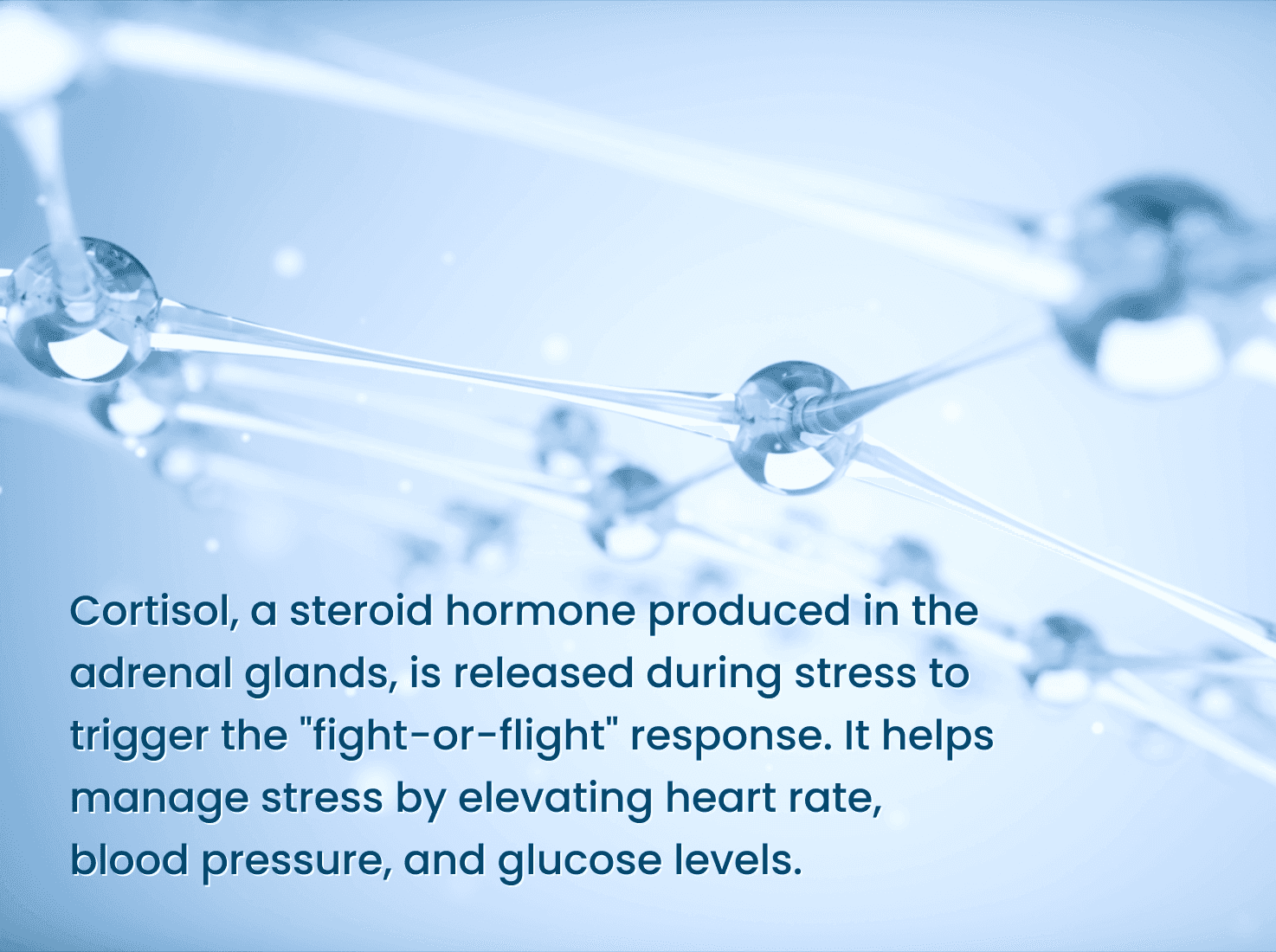First consultation?
Need a refill?
First consultation?
Need a refill?
How to Reduce Cortisol Levels: A Guide to Managing Stress for Better Health
Lifestyle

Eileen Quinones
•
6 mins
• Dec 24, 2024
Cortisol, often referred to as the body’s stress hormone, plays a vital role in our physiological processes. Produced by the adrenal glands, cortisol is involved in regulating metabolism, reducing inflammation, controlling the sleep-wake cycle, and managing how the body responds to stress. While cortisol is crucial for survival, prolonged elevated levels can have significant health consequences. Chronic stress, poor sleep, and unhealthy lifestyles are common culprits behind elevated cortisol levels, which in turn can contribute to a variety of health issues like weight gain, hypertension, memory problems, and anxiety.
In this blog, we’ll explore the causes of high cortisol levels, how they affect the body, and most importantly, how you can effectively reduce cortisol through lifestyle changes, diet, and natural supplements.

What is Cortisol and Where is it Produced?
Cortisol is a steroid hormone produced in the adrenal glands, which are located just above your kidneys. It is primarily released during times of stress, in response to signals from the brain via the hypothalamus-pituitary-adrenal (HPA) axis. This hormone helps the body cope with stress by triggering the "fight-or-flight" response, elevating heart rate, blood pressure, and glucose levels to fuel quick action.
Cortisol at the Cellular Level¹
Cortisol is synthesized from cholesterol in the zona fasciculata of the adrenal cortex. The production of cortisol is regulated by the secretion of adrenocorticotropic hormone (ACTH) from the pituitary gland. Once produced, cortisol circulates in the bloodstream, typically bound to corticosteroid-binding globulin (CBG) or albumin, in an inactive form. The inactive form of cortisol is converted into its active form in tissues by the enzyme 11-beta-hydroxysteroid dehydrogenase 1 (11-beta-HSD1).
Despite its stress-related reputation, cortisol has many essential functions in the body:
Stress Response: It triggers the fight-or-flight reaction, increasing alertness and preparing the body for immediate action.
Immune System: Cortisol plays a role in reducing inflammation and modulating immune responses.
Metabolism: Cortisol influences glucose and fat metabolism by stimulating gluconeogenesis (production of glucose) and lipolysis (fat breakdown).
Sleep-Wake Cycle: Cortisol levels follow a natural circadian rhythm, being highest in the morning to help you wake up and lowest at night to facilitate restful sleep.

The Issues Caused by High Cortisol Levels
Chronic or prolonged exposure to high cortisol levels can negatively affect various bodily systems and contribute to several health problems:¹
High Blood Pressure: Elevated cortisol levels can increase blood pressure, contributing to cardiovascular issues.
Memory and Concentration Issues: Chronic stress and high cortisol can impair brain function, affecting memory and concentration.
Fatigue: Persistently high cortisol levels can lead to feelings of extreme fatigue, often due to the body being in a constant state of "alert."
Irritability and Mood Swings: Cortisol can affect mood-regulating neurotransmitters, leading to irritability and mood disorders like anxiety and depression.
Muscle Breakdown: High cortisol levels increase protein breakdown in muscle tissue, leading to muscle weakness.
Impaired Immune Function: Elevated cortisol suppresses the immune system, making the body more susceptible to infections.
Weight Gain: Especially in the abdominal area, where cortisol encourages fat storage.
Slower Wound Healing and Easy Bruising: Cortisol can slow the healing process and make blood vessels more fragile, increasing the likelihood of bruising.
If left unchecked, high cortisol levels can contribute to chronic conditions like metabolic syndrome, obesity, anxiety disorders, and even cardiovascular disease.
How to Reduce Cortisol Levels Naturally
While cortisol is a crucial hormone for survival, chronic overproduction can lead to health complications. Fortunately, several lifestyle strategies can help manage and lower cortisol levels naturally. These include regular physical activity, a balanced diet, quality sleep, and mindfulness practices.
Regular Physical Activity²
Exercise is one of the most effective ways to reduce cortisol. Regular physical activity, such as jogging, swimming, and even walking, helps the body regulate cortisol levels and reduces stress. Studies show that moderate aerobic exercise can significantly lower cortisol levels by enhancing the body’s ability to manage stress. Additionally, exercise triggers the release of endorphins, chemicals that improve mood and promote relaxation.
Scientific Support: A systematic review found that regular physical activity could effectively lower cortisol levels and improve sleep quality in individuals under stress, particularly those with long-term conditions or poor mental health⁶.

Balanced Diet³
What you eat plays a crucial role in managing cortisol levels. A diet rich in whole foods, such as fish, avocados, broccoli, and fermented foods like sauerkraut, can help balance cortisol. Avoid excessive sugar intake, as it can trigger cortisol release.
Foods that Reduce Cortisol:
Dark Chocolate: Contains flavonoids that can reduce cortisol levels.
Fish/Seafood: Rich in omega-3 fatty acids, which help manage inflammation and stress.
Green/Black Tea: Contains L-theanine, which has been shown to reduce cortisol and promote relaxation.
Scientific Insight: Poor blood glucose control and unhealthy eating habits can increase cortisol secretion, leading to a vicious cycle of stress and poor dietary choices. Improving diet quality can help break this cycle and reduce cortisol levels.

Sleep and Stress Management⁴
Cortisol is closely linked to the sleep-wake cycle. Lack of sleep or poor-quality sleep can trigger elevated cortisol levels, leading to stress and weight gain. Aim for 7-9 hours of consistent sleep each night and stick to a regular sleep schedule to regulate cortisol naturally.
Scientific Support: Research shows that sleep deprivation activates the HPA axis and leads to increased cortisol secretion. Improving sleep quality can reduce the HPA axis hyperactivity often associated with high cortisol.

Mindfulness, Meditation, and Yoga⁵
Mindfulness meditation is a powerful technique to reduce stress and lower cortisol. Studies show that mindfulness practices, such as meditation and yoga, can significantly decrease cortisol levels and improve mental health.
Scientific Support: Mindfulness meditation has been found to significantly lower serum cortisol, suggesting that it can reduce stress and improve overall well-being.
Supplements That Can Help Lower Cortisol
Certain natural supplements have been shown to help reduce cortisol levels. These include:
Ashwagandha⁷
Ashwagandha, a popular adaptogen, has been shown to reduce cortisol levels by up to 20%. Clinical trials suggest that ashwagandha can help manage stress and anxiety, improve sleep, and lower cortisol, especially in individuals under chronic stress.
L-Theanine⁸
Found in tea, L-theanine has been shown to increase GABA activity, which promotes relaxation and reduces cortisol levels. It is commonly used to manage stress and anxiety, as well as to enhance cognitive function.
Vitamin B Complex⁹
B vitamins, particularly B12, are essential for managing stress. Chronic stress can deplete the body’s vitamin B12 levels, and supplementation may help mitigate stress-induced cortisol release. B vitamins support the nervous system and help improve cognitive function during stressful periods.
Melatonin¹⁰
Melatonin supplements, often used for sleep, can help regulate the circadian rhythm and lower cortisol levels. By improving sleep, melatonin can help reduce the overall cortisol response and support metabolic health.
Things to Limit to Lower Cortisol
Certain lifestyle factors can contribute to elevated cortisol levels. Limiting these can help reduce stress and lower cortisol production:
Caffeine Intake¹¹
Moderate caffeine intake can also trigger cortisol release. Although tolerance may develop over time, it’s still important to moderate caffeine consumption to avoid significant spikes in cortisol, especially in sensitive individuals.
Alcohol Consumption¹²
Excessive alcohol consumption raises cortisol levels and disrupts sleep, leading to increased stress and potential health issues. Studies show that alcohol intake is directly related to elevated cortisol secretion, especially in heavy drinkers.
Conclusion
Cortisol is an essential hormone that helps the body respond to stress, but chronic high levels can lead to a wide range of health issues. Managing cortisol involves adopting a holistic approach that includes regular physical activity, a balanced diet, quality sleep, mindfulness practices, and specific supplements. By reducing the factors that increase cortisol—like stress, poor sleep, and unhealthy habits—and incorporating healthy practices, you can effectively lower cortisol levels and improve your overall health.
By staying mindful of your lifestyle choices and prioritizing well-being, you can keep cortisol levels balanced and foster a healthier, more resilient body and mind.
Sources :
Cortisol mechanisms and side effects : Thau, L., Gandhi, J., & Sharma, S. (2023, August 28). Physiology, cortisol. StatPearls - NCBI Bookshelf. https://www.ncbi.nlm.nih.gov/books/NBK538239/
Physical activity and cortisol : De Nys, L., Anderson, K., Ofosu, E. F., Ryde, G. C., Connelly, J., & Whittaker, A. C. (2022). The effects of physical activity on cortisol and sleep: A systematic review and meta-analysis. Psychoneuroendocrinology, 143, 105843. https://doi.org/10.1016/j.psyneuen.2022.105843
Poor diet and cortisol levels : Duong, M., Cohen, J. I., & Convit, A. (2011). High cortisol levels are associated with low quality food choice in type 2 diabetes. Endocrine, 41(1), 76–81. https://doi.org/10.1007/s12020-011-9527-5
Interactions between sleep, stress, and metabolism : Hirotsu, C., Tufik, S., & Andersen, M. L. (2015). Interactions between sleep, stress, and metabolism: From physiological to pathological conditions. Sleep Science, 8(3), 143–152. https://doi.org/10.1016/j.slsci.2015.09.002
Effects of meditation on serum cortisol : Effects of mindfulness meditation on serum cortisol of medical students. (2013, January 1). PubMed. https://pubmed.ncbi.nlm.nih.gov/23724462/
Hydration, exercise and cortisol : Maresh CM, Whittlesey MJ, Armstrong LE, Yamamoto LM, Judelson DA, Fish KE, Casa DJ, Kavouras SA, Castracane VD. Effect of hydration state on testosterone and cortisol responses to training-intensity exercise in collegiate runners. Int J Sports Med. 2006 Oct;27(10):765-70. doi: 10.1055/s-2005-872932. PMID: 17006802.
Ashwagandha for cortisol : Office of Dietary Supplements - Ashwagandha: Is it helpful for stress, anxiety, or sleep? (n.d.). https://ods.od.nih.gov/factsheets/Ashwagandha-HealthProfessional/
L-Theanine and stress + cognitive function : Hidese, S., Ogawa, S., Ota, M., Ishida, I., Yasukawa, Z., Ozeki, M., & Kunugi, H. (2019). Effects of L-Theanine Administration on Stress-Related Symptoms and Cognitive Functions in healthy adults: a randomized controlled trial. Nutrients, 11(10), 2362. https://doi.org/10.3390/nu11102362
Vitamin B12, androgens and cortisol : Lodhi, R., & Panchal, A. (2014). Interrelationship of Vitamin B12, Androgens and Cortisol in Chronic Stress and associated Vascular Dysfunction. www.jscimedcentral.com. https://doi.org/10.47739/1028
Multivitamin supplementation and diurnal cortisol secretion : Camfield, D., Wetherell, M., Scholey, A., Cox, K., Fogg, E., White, D., Sarris, J., Kras, M., Stough, C., Sali, A., & Pipingas, A. (2013). The effects of multivitamin supplementation on diurnal cortisol secretion and perceived stress. Nutrients, 5(11), 4429–4450. https://doi.org/10.3390/nu5114429
Caffeine and cortisol : Lovallo, W. R., Whitsett, T. L., Al’Absi, M., Sung, B. H., Vincent, A. S., & Wilson, M. F. (2005). Caffeine stimulation of cortisol secretion across the waking hours in relation to caffeine intake levels. Psychosomatic Medicine, 67(5), 734–739. https://doi.org/10.1097/01.psy.0000181270.20036.06
Alcohol and cortisol : Badrick E, Bobak M, Britton A, Kirschbaum C, Marmot M, Kumari M. The relationship between alcohol consumption and cortisol secretion in an aging cohort. J Clin Endocrinol Metab. 2008 Mar;93(3):750-7. doi: 10.1210/jc.2007-0737. Epub 2007 Dec 11. PMID: 18073316; PMCID: PMC2266962.
Current version
Dec 24, 2024
Written by
Lose weight effectively
with GLP-1s
Complete our quick questionnaire to identify if you qualify. (approx 3 min)

Similar Health Guides
Lose weight effectively
with GLP-1s
Complete our quick questionnaire to identify if you qualify. (approx 3 min)

Lose weight effectively
with GLP-1s
Complete our quick questionnaire to identify if you qualify. (approx 3 min)

Get meds delivered from
the comfort of your home.
Download our app now, and get amazing rewards!


How to Reduce Cortisol Levels: A Guide to Managing Stress for Better Health
Lifestyle

Eileen Quinones
•
6 mins
• Dec 24, 2024
Cortisol, often referred to as the body’s stress hormone, plays a vital role in our physiological processes. Produced by the adrenal glands, cortisol is involved in regulating metabolism, reducing inflammation, controlling the sleep-wake cycle, and managing how the body responds to stress. While cortisol is crucial for survival, prolonged elevated levels can have significant health consequences. Chronic stress, poor sleep, and unhealthy lifestyles are common culprits behind elevated cortisol levels, which in turn can contribute to a variety of health issues like weight gain, hypertension, memory problems, and anxiety.
In this blog, we’ll explore the causes of high cortisol levels, how they affect the body, and most importantly, how you can effectively reduce cortisol through lifestyle changes, diet, and natural supplements.

What is Cortisol and Where is it Produced?
Cortisol is a steroid hormone produced in the adrenal glands, which are located just above your kidneys. It is primarily released during times of stress, in response to signals from the brain via the hypothalamus-pituitary-adrenal (HPA) axis. This hormone helps the body cope with stress by triggering the "fight-or-flight" response, elevating heart rate, blood pressure, and glucose levels to fuel quick action.
Cortisol at the Cellular Level¹
Cortisol is synthesized from cholesterol in the zona fasciculata of the adrenal cortex. The production of cortisol is regulated by the secretion of adrenocorticotropic hormone (ACTH) from the pituitary gland. Once produced, cortisol circulates in the bloodstream, typically bound to corticosteroid-binding globulin (CBG) or albumin, in an inactive form. The inactive form of cortisol is converted into its active form in tissues by the enzyme 11-beta-hydroxysteroid dehydrogenase 1 (11-beta-HSD1).
Despite its stress-related reputation, cortisol has many essential functions in the body:
Stress Response: It triggers the fight-or-flight reaction, increasing alertness and preparing the body for immediate action.
Immune System: Cortisol plays a role in reducing inflammation and modulating immune responses.
Metabolism: Cortisol influences glucose and fat metabolism by stimulating gluconeogenesis (production of glucose) and lipolysis (fat breakdown).
Sleep-Wake Cycle: Cortisol levels follow a natural circadian rhythm, being highest in the morning to help you wake up and lowest at night to facilitate restful sleep.

The Issues Caused by High Cortisol Levels
Chronic or prolonged exposure to high cortisol levels can negatively affect various bodily systems and contribute to several health problems:¹
High Blood Pressure: Elevated cortisol levels can increase blood pressure, contributing to cardiovascular issues.
Memory and Concentration Issues: Chronic stress and high cortisol can impair brain function, affecting memory and concentration.
Fatigue: Persistently high cortisol levels can lead to feelings of extreme fatigue, often due to the body being in a constant state of "alert."
Irritability and Mood Swings: Cortisol can affect mood-regulating neurotransmitters, leading to irritability and mood disorders like anxiety and depression.
Muscle Breakdown: High cortisol levels increase protein breakdown in muscle tissue, leading to muscle weakness.
Impaired Immune Function: Elevated cortisol suppresses the immune system, making the body more susceptible to infections.
Weight Gain: Especially in the abdominal area, where cortisol encourages fat storage.
Slower Wound Healing and Easy Bruising: Cortisol can slow the healing process and make blood vessels more fragile, increasing the likelihood of bruising.
If left unchecked, high cortisol levels can contribute to chronic conditions like metabolic syndrome, obesity, anxiety disorders, and even cardiovascular disease.
How to Reduce Cortisol Levels Naturally
While cortisol is a crucial hormone for survival, chronic overproduction can lead to health complications. Fortunately, several lifestyle strategies can help manage and lower cortisol levels naturally. These include regular physical activity, a balanced diet, quality sleep, and mindfulness practices.
Regular Physical Activity²
Exercise is one of the most effective ways to reduce cortisol. Regular physical activity, such as jogging, swimming, and even walking, helps the body regulate cortisol levels and reduces stress. Studies show that moderate aerobic exercise can significantly lower cortisol levels by enhancing the body’s ability to manage stress. Additionally, exercise triggers the release of endorphins, chemicals that improve mood and promote relaxation.
Scientific Support: A systematic review found that regular physical activity could effectively lower cortisol levels and improve sleep quality in individuals under stress, particularly those with long-term conditions or poor mental health⁶.

Balanced Diet³
What you eat plays a crucial role in managing cortisol levels. A diet rich in whole foods, such as fish, avocados, broccoli, and fermented foods like sauerkraut, can help balance cortisol. Avoid excessive sugar intake, as it can trigger cortisol release.
Foods that Reduce Cortisol:
Dark Chocolate: Contains flavonoids that can reduce cortisol levels.
Fish/Seafood: Rich in omega-3 fatty acids, which help manage inflammation and stress.
Green/Black Tea: Contains L-theanine, which has been shown to reduce cortisol and promote relaxation.
Scientific Insight: Poor blood glucose control and unhealthy eating habits can increase cortisol secretion, leading to a vicious cycle of stress and poor dietary choices. Improving diet quality can help break this cycle and reduce cortisol levels.

Sleep and Stress Management⁴
Cortisol is closely linked to the sleep-wake cycle. Lack of sleep or poor-quality sleep can trigger elevated cortisol levels, leading to stress and weight gain. Aim for 7-9 hours of consistent sleep each night and stick to a regular sleep schedule to regulate cortisol naturally.
Scientific Support: Research shows that sleep deprivation activates the HPA axis and leads to increased cortisol secretion. Improving sleep quality can reduce the HPA axis hyperactivity often associated with high cortisol.

Mindfulness, Meditation, and Yoga⁵
Mindfulness meditation is a powerful technique to reduce stress and lower cortisol. Studies show that mindfulness practices, such as meditation and yoga, can significantly decrease cortisol levels and improve mental health.
Scientific Support: Mindfulness meditation has been found to significantly lower serum cortisol, suggesting that it can reduce stress and improve overall well-being.
Supplements That Can Help Lower Cortisol
Certain natural supplements have been shown to help reduce cortisol levels. These include:
Ashwagandha⁷
Ashwagandha, a popular adaptogen, has been shown to reduce cortisol levels by up to 20%. Clinical trials suggest that ashwagandha can help manage stress and anxiety, improve sleep, and lower cortisol, especially in individuals under chronic stress.
L-Theanine⁸
Found in tea, L-theanine has been shown to increase GABA activity, which promotes relaxation and reduces cortisol levels. It is commonly used to manage stress and anxiety, as well as to enhance cognitive function.
Vitamin B Complex⁹
B vitamins, particularly B12, are essential for managing stress. Chronic stress can deplete the body’s vitamin B12 levels, and supplementation may help mitigate stress-induced cortisol release. B vitamins support the nervous system and help improve cognitive function during stressful periods.
Melatonin¹⁰
Melatonin supplements, often used for sleep, can help regulate the circadian rhythm and lower cortisol levels. By improving sleep, melatonin can help reduce the overall cortisol response and support metabolic health.
Things to Limit to Lower Cortisol
Certain lifestyle factors can contribute to elevated cortisol levels. Limiting these can help reduce stress and lower cortisol production:
Caffeine Intake¹¹
Moderate caffeine intake can also trigger cortisol release. Although tolerance may develop over time, it’s still important to moderate caffeine consumption to avoid significant spikes in cortisol, especially in sensitive individuals.
Alcohol Consumption¹²
Excessive alcohol consumption raises cortisol levels and disrupts sleep, leading to increased stress and potential health issues. Studies show that alcohol intake is directly related to elevated cortisol secretion, especially in heavy drinkers.
Conclusion
Cortisol is an essential hormone that helps the body respond to stress, but chronic high levels can lead to a wide range of health issues. Managing cortisol involves adopting a holistic approach that includes regular physical activity, a balanced diet, quality sleep, mindfulness practices, and specific supplements. By reducing the factors that increase cortisol—like stress, poor sleep, and unhealthy habits—and incorporating healthy practices, you can effectively lower cortisol levels and improve your overall health.
By staying mindful of your lifestyle choices and prioritizing well-being, you can keep cortisol levels balanced and foster a healthier, more resilient body and mind.
Current version
Dec 24, 2024
Written by
Fact checked by
Sources :
Cortisol mechanisms and side effects : Thau, L., Gandhi, J., & Sharma, S. (2023, August 28). Physiology, cortisol. StatPearls - NCBI Bookshelf. https://www.ncbi.nlm.nih.gov/books/NBK538239/
Physical activity and cortisol : De Nys, L., Anderson, K., Ofosu, E. F., Ryde, G. C., Connelly, J., & Whittaker, A. C. (2022). The effects of physical activity on cortisol and sleep: A systematic review and meta-analysis. Psychoneuroendocrinology, 143, 105843. https://doi.org/10.1016/j.psyneuen.2022.105843
Poor diet and cortisol levels : Duong, M., Cohen, J. I., & Convit, A. (2011). High cortisol levels are associated with low quality food choice in type 2 diabetes. Endocrine, 41(1), 76–81. https://doi.org/10.1007/s12020-011-9527-5
Interactions between sleep, stress, and metabolism : Hirotsu, C., Tufik, S., & Andersen, M. L. (2015). Interactions between sleep, stress, and metabolism: From physiological to pathological conditions. Sleep Science, 8(3), 143–152. https://doi.org/10.1016/j.slsci.2015.09.002
Effects of meditation on serum cortisol : Effects of mindfulness meditation on serum cortisol of medical students. (2013, January 1). PubMed. https://pubmed.ncbi.nlm.nih.gov/23724462/
Hydration, exercise and cortisol : Maresh CM, Whittlesey MJ, Armstrong LE, Yamamoto LM, Judelson DA, Fish KE, Casa DJ, Kavouras SA, Castracane VD. Effect of hydration state on testosterone and cortisol responses to training-intensity exercise in collegiate runners. Int J Sports Med. 2006 Oct;27(10):765-70. doi: 10.1055/s-2005-872932. PMID: 17006802.
Ashwagandha for cortisol : Office of Dietary Supplements - Ashwagandha: Is it helpful for stress, anxiety, or sleep? (n.d.). https://ods.od.nih.gov/factsheets/Ashwagandha-HealthProfessional/
L-Theanine and stress + cognitive function : Hidese, S., Ogawa, S., Ota, M., Ishida, I., Yasukawa, Z., Ozeki, M., & Kunugi, H. (2019). Effects of L-Theanine Administration on Stress-Related Symptoms and Cognitive Functions in healthy adults: a randomized controlled trial. Nutrients, 11(10), 2362. https://doi.org/10.3390/nu11102362
Vitamin B12, androgens and cortisol : Lodhi, R., & Panchal, A. (2014). Interrelationship of Vitamin B12, Androgens and Cortisol in Chronic Stress and associated Vascular Dysfunction. www.jscimedcentral.com. https://doi.org/10.47739/1028
Multivitamin supplementation and diurnal cortisol secretion : Camfield, D., Wetherell, M., Scholey, A., Cox, K., Fogg, E., White, D., Sarris, J., Kras, M., Stough, C., Sali, A., & Pipingas, A. (2013). The effects of multivitamin supplementation on diurnal cortisol secretion and perceived stress. Nutrients, 5(11), 4429–4450. https://doi.org/10.3390/nu5114429
Caffeine and cortisol : Lovallo, W. R., Whitsett, T. L., Al’Absi, M., Sung, B. H., Vincent, A. S., & Wilson, M. F. (2005). Caffeine stimulation of cortisol secretion across the waking hours in relation to caffeine intake levels. Psychosomatic Medicine, 67(5), 734–739. https://doi.org/10.1097/01.psy.0000181270.20036.06
Alcohol and cortisol : Badrick E, Bobak M, Britton A, Kirschbaum C, Marmot M, Kumari M. The relationship between alcohol consumption and cortisol secretion in an aging cohort. J Clin Endocrinol Metab. 2008 Mar;93(3):750-7. doi: 10.1210/jc.2007-0737. Epub 2007 Dec 11. PMID: 18073316; PMCID: PMC2266962.



